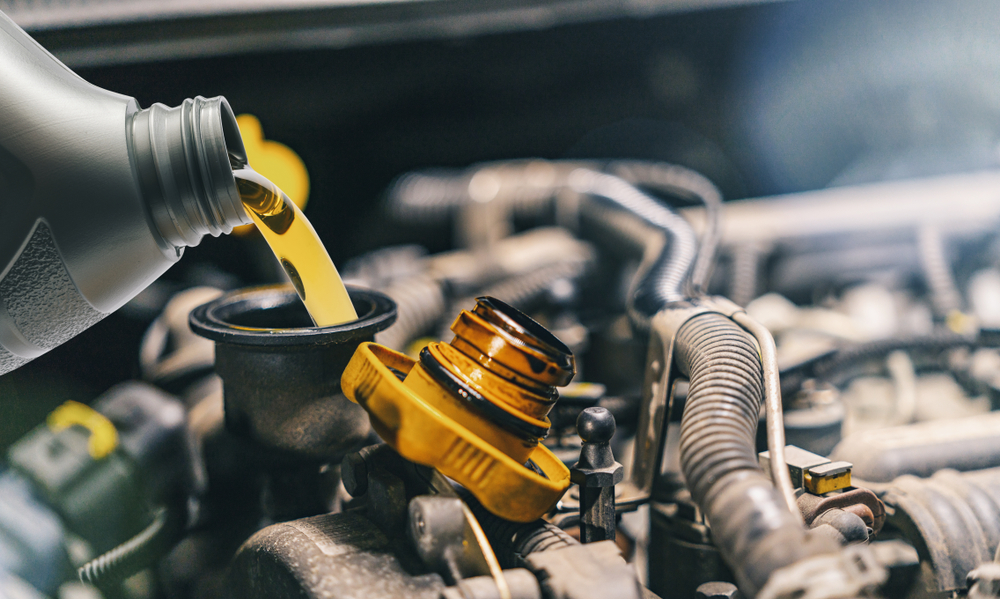
As vehicles age, their engines require extra care and attention to maintain optimal performance and longevity. One question that often arises among car owners is whether switching to full synthetic oil is beneficial for older engines. In this blog, we’ll delve into the topic of Full synthetic oil for older engines and explore the potential benefits and considerations of using synthetic oil in aging vehicles.
Understanding Full Synthetic Oil
Before diving into its impact on older engines, it’s essential to understand what full synthetic oil is and how it differs from conventional motor oil. Full synthetic oil is engineered from highly refined base oils and advanced additives, offering superior performance and protection compared to conventional oils. It boasts higher viscosity stability, better resistance to thermal breakdown, and improved lubrication properties, making it an attractive option for drivers seeking enhanced engine protection and performance.
Benefits of Synthetic Oil in Aging Vehicles
While conventional wisdom may suggest that older engines require conventional motor oil, there are several compelling reasons to consider switching to full synthetic oil:
- Enhanced Engine Protection: Older engines may exhibit signs of wear and tear, such as increased friction, reduced compression, and oil leaks. Full synthetic oil’s advanced formulation provides better lubrication and wear protection, helping to minimize engine wear and extend its lifespan.
- Improved Fuel Efficiency: Synthetic oils have lower viscosity and better flow properties than conventional oils, resulting in reduced friction and improved fuel efficiency. This can be particularly beneficial for older engines, which may experience decreased efficiency due to wear and internal friction.
- Better Cold-Start Performance: Older engines may struggle to start in cold weather conditions, especially if they are equipped with high-mileage or worn components. Full synthetic oil flows more freely at low temperatures, providing better cold-start performance and reducing engine wear during startup.
- Extended Oil Change Intervals: Synthetic oils have superior thermal stability and resistance to oxidation, allowing them to maintain their viscosity and performance characteristics for longer periods. This means that drivers can potentially extend their oil change intervals when using full synthetic oil, reducing maintenance costs and hassle for owners of older vehicles.
- Reduced Engine Deposits: Synthetic oils are less prone to forming sludge, deposits, and varnish buildup compared to conventional oils. This can help keep older engines cleaner and free from harmful contaminants, improving overall engine performance and reliability over time.
Considerations for Older Engines
While full synthetic oil offers several benefits for older engines, there are a few considerations to keep in mind:
- Compatibility: Before switching to full synthetic oil, it’s essential to check whether it is compatible with your vehicle’s engine specifications and requirements. Some older engines may not be designed to handle synthetic oils, or they may require specific formulations or viscosities.
- Oil Consumption: Older engines may experience higher oil consumption compared to newer engines, especially if they have worn seals or gaskets. While synthetic oils can help reduce oil consumption to some extent, it’s essential to monitor oil levels regularly and address any leaks or issues promptly.
- Cost: Full synthetic oil typically comes at a higher price point than conventional motor oil. While the potential benefits of synthetic oil may justify the additional cost for some drivers, others may prefer to stick with conventional oil to save money, especially for older vehicles with limited remaining lifespan.
- Consultation with a Mechanic: If you’re considering switching to full synthetic oil for your older vehicle, it’s advisable to consult with a qualified mechanic or automotive technician. They can provide personalized recommendations based on your vehicle’s condition, mileage, and maintenance history, ensuring that you make an informed decision that is best for your engine’s health and performance.
Summary
Full synthetic oil can have a positive impact on older engines, providing enhanced protection, improved performance, and potential cost savings over time. By understanding the benefits and considerations of using synthetic oil in aging vehicles, drivers can make informed decisions about their engine maintenance and choose the oil that best suits their needs. Whether you’re looking to extend your engine’s lifespan, improve fuel efficiency, or reduce maintenance costs, full synthetic oil offers a compelling option for owners of older vehicles seeking optimal performance and reliability.
Need an Auto Repair Shop in Grand Junction, CO?
Since 1976, Scotty’s Complete Car Care Center has been proud to have a strong presence in the great community that we all live in. As a family owned and operated business Scotty’s has evolved from a small two bay muffler shop to Your Complete Car Care Center. Scotty’s Complete Car Care Center now houses more than 23 repair bays to perform anything from quick full service oil changes to engine repair in the undercar center. It is important to everyone at Scotty’s Complete Car Care Center to provide the Grand Valley with quality auto repairs at a fair price. Contact us today to learn more about what we can do for you!
Regular maintenance is essential for keeping your vehicle in optimal condition. And while many car owners tend to overlook oil changes, it’s crucial to understand the importance of this routine task. In this blog post, we’ll explore the significance of staying on top of
oil changes and shed light on the potential consequences of neglecting this essential maintenance.
The Purpose of Oil
Your vehicle’s engine contains numerous moving parts that generate substantial heat and friction. The primary function of oil is to lubricate these components to reduce wear and ensure smooth operation. Furthermore, oil aids in cooling the engine, preventing it from overheating. Over time, oil breaks down, loses its lubricating properties, and becomes contaminated, making regular oil changes necessary.
The Importance of Timely Oil Changes
1. Enhanced Engine Performance and Efficiency:
Fresh, clean oil promotes optimal engine performance, ensuring that all components work harmoniously. The engine runs more smoothly, providing maximum power and fuel efficiency. Regular oil changes help maintain your vehicle’s performance and save on fuel costs in the long run.
2. Extended Engine Life:
A well-lubricated engine experiences less wear and tear, prolonging its lifespan. When oil becomes dirty and sludgy, it fails to provide sufficient lubrication, causing friction and damage to critical engine components. Regular oil changes can help prevent costly repairs and ensure your vehicle serves you reliably for years.
3. Improved Engine Protection:
Clean oil acts as a protective barrier, preventing contaminants, dirt, and debris from entering the engine. If neglected, these impurities can accumulate, causing corrosion and damage to internal engine parts. Timely oil changes are vital in safeguarding your engine and maintaining its long-term reliability.
Consequences of Skipping Oil Changes
1. Reduced Fuel Efficiency:
Dirty and degraded oil makes it harder for your engine to operate efficiently, subsequently leading to increased fuel consumption. Neglecting oil changes can result in reduced miles per gallon and unnecessary spending on excessive fuel.
2. Engine Damage and Costly Repairs:
As mentioned, worn-out oil fails to provide adequate lubrication, leading to increased friction and heat buildup. This can result in engine damage such as piston ring failure, valve damage, or even complete engine failure. Replacing or repairing these major engine components can be exorbitantly expensive, and in some cases, not financially viable. By skipping oil changes, you risk permanent damage to your engine and significant financial burdens.
3. Decreased Performance and Safety Risks:
Neglected oil changes can cause various engine problems, including reduced horsepower, sluggish acceleration, and rough idling. As a consequence, your vehicle’s performance may decline, compromising its handling, response time, and overall safety. Regular oil changes ensure that your vehicle is always operating at its peak performance, allowing for a safer and smoother driving experience.
Get Your Oil Changed at Scotty’s Complete Car Care Center
The significance of regular oil changes cannot be overstated when it comes to maintaining your vehicle’s health, performance, and longevity. By following the recommended oil change intervals, you can avoid the potential consequences of neglecting this essential maintenance task. Trusting the job to experienced
auto professionals, such as our team here at Scotty’s Complete Car Care Center, guarantees that your oil changes are done correctly, ensuring maximum protection and performance for your vehicle.
So the next time your vehicle is due for an oil change, don’t delay it any further.
Schedule your oil change today and experience the peace of mind that comes with responsible vehicle ownership!
Common Signs That Indicate Your Vehicle Needs An Oil Change
Regular oil changes are an essential part of vehicle maintenance. They help keep your engine running smoothly and prevent costly repairs down the line. But how do you know when it’s time to change your oil? Here are some common signs that indicate your vehicle needs an oil change.
1. Check Engine Light
One of the most obvious signs that your vehicle needs an oil change is the check engine light. If this light comes on, it could be a sign that your engine oil is dirty or low. Ignoring this warning can lead to engine damage and more expensive repairs. So, if you see the check engine light, it’s best to bring your vehicle to a trusted mechanic as soon as possible.
2. Dark and Dirty Oil
Checking your oil regularly and inspecting its condition can help determine if it’s time for an oil change. Fresh oil is usually amber or golden in color. However, over time, the oil will become darker and dirtier as it picks up debris and contaminants from the engine. If you notice that your oil is thick, black, or gritty, it’s a clear sign that it’s time for a change.
3. Loud Engine Noise
If you start to notice strange sounds coming from your engine, it could be a sign that your oil is low or old. Engine oil helps lubricate moving parts and reduces friction, so when it’s not doing its job properly, you may hear a knocking or rattling noise. This noise usually occurs when the oil is not able to reach all the necessary areas in your engine, indicating that an oil change is necessary.
4. Decreased Fuel Efficiency
Another sign that your vehicle needs an oil change is a decrease in fuel efficiency. Dirty oil creates more friction, making the engine work harder and using more fuel. If you notice that you’re not getting as many miles per gallon as you used to, it could be a result of dirty or low oil levels. Changing your oil regularly can help improve your fuel efficiency and save you money in the long run.
5. Burning Smell
If you start to smell something burning while driving your vehicle, it could be a sign that the oil is old and needs to be changed. Over time, oil breaks down and loses its lubrication properties, which can lead to overheating in the engine. This can cause a burning smell and potentially cause serious damage to your engine if not addressed promptly.
6. Engine Overheating
Regular oil changes help regulate the temperature of your engine by reducing friction and preventing overheating. If your engine starts to overheat, it could be a sign that your oil has become too dirty and ineffective in cooling the engine. An overheating engine can lead to major mechanical issues and should be addressed immediately by a professional.
7. Exhaust Smoke
Exhaust smoke can be an indication that your oil is old and needs to be changed. If you notice blue or gray smoke coming from your exhaust pipe, it usually means that oil is burning inside the engine. This can be caused by worn-out piston rings or seals, which allow oil to leak into the combustion chamber. Regular oil changes can help prevent this issue and keep your exhaust clean and smoke-free.
Summary
Regular oil changes are crucial for maintaining the performance and longevity of your vehicle. By paying attention to these common signs, you can ensure that your vehicle receives the necessary oil changes when needed. Remember, it’s always best to consult a professional mechanic to assess your vehicle’s oil condition and determine the appropriate time for an oil change.
Got Questions? Let Us Help!
Since 1976, Scotty’s Complete Car Care Center has been proud to have a strong presence in the great community that we all live in. As a family owned and operated business Scotty’s has evolved from a small two bay muffler shop to Your Complete Car Care Center. Scotty’s Complete Car Care Center now houses more than 23 repair bays to perform anything from quick full service oil changes to engine repair in the undercar center. It is important to everyone at Scotty’s Complete Car Care Center to provide the Grand Valley with quality auto repairs at a fair price. Contact us today to learn more about what we can do for you!



